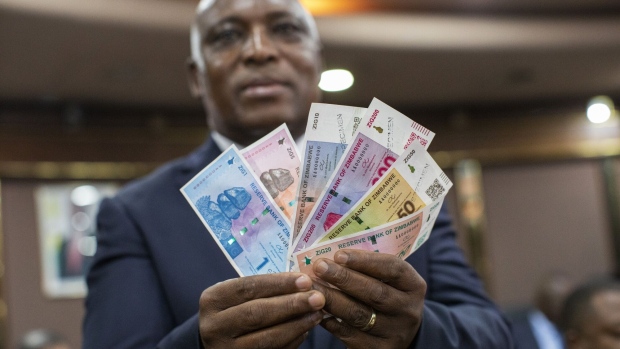Apr 29, 2024
Zimbabwe Keeps Key Rate in First Meeting Since ZiG Debut
, Bloomberg News

(Bloomberg) -- Zimbabwe’s central bank started circulating ZiG notes and coins among the public, a day after policymakers kept interest rates unchanged at their first meeting since unveiling the new currency.
The ZiG, short for Zimbabwe Gold, is the southern African nation’s sixth attempt since 2008 to deliver a stable domestic currency. It was announced on April 5 and transacting in the unit has been done electronically since trade started three days later.
The monetary policy committee held the key rate at 20% after receiving positive market reaction to the new currency, Governor John Mushayavanhu said in a statement on Monday. The MPC expects the currency reforms to help provide “stability, certainty and predictability in the exchange rate and inflation,” he said. That will be put to the test with the physical notes now in circulation.
All of the nation’s 19 lenders received the banknotes and coins by close of business on Monday to facilitate smooth-running, said Lawrence Nyazema, president of the Bankers Association of Zimbabwe.
“We expect more notes to go into the market over the next couple of weeks and months to achieve enough circulation,” he said Tuesday by text message. “We are encouraging customers and clients to continue using electronic systems alongside the new notes when making payments.”
Read More: Zimbabwe to Give Indication of ZiG’s Impact on Inflation in May
The ZiG replaced the foundering Zimbabwean dollar, which lost value every single trading day of this year against the greenback before it was scrapped.
The rapid depreciation led many Zimbabweans to transact in US dollars, leading it to be used in more than 80% of transactions.
The largest denomination of the new local currency is 200 ZiG, worth $15, and authorities hope widespread uptake of the ZiG will help to reverse the local dominance of the greenback.
The ZiG is backed by 2.5 tons of gold and $100 million in foreign currency reserves held by the central bank. The new unit’s introduction led the central bank to reset interest rates from 130%, a world record, to 20%.
(Recasts to update with circulation of ZiG banknotes, adds details throughout)
©2024 Bloomberg L.P.








